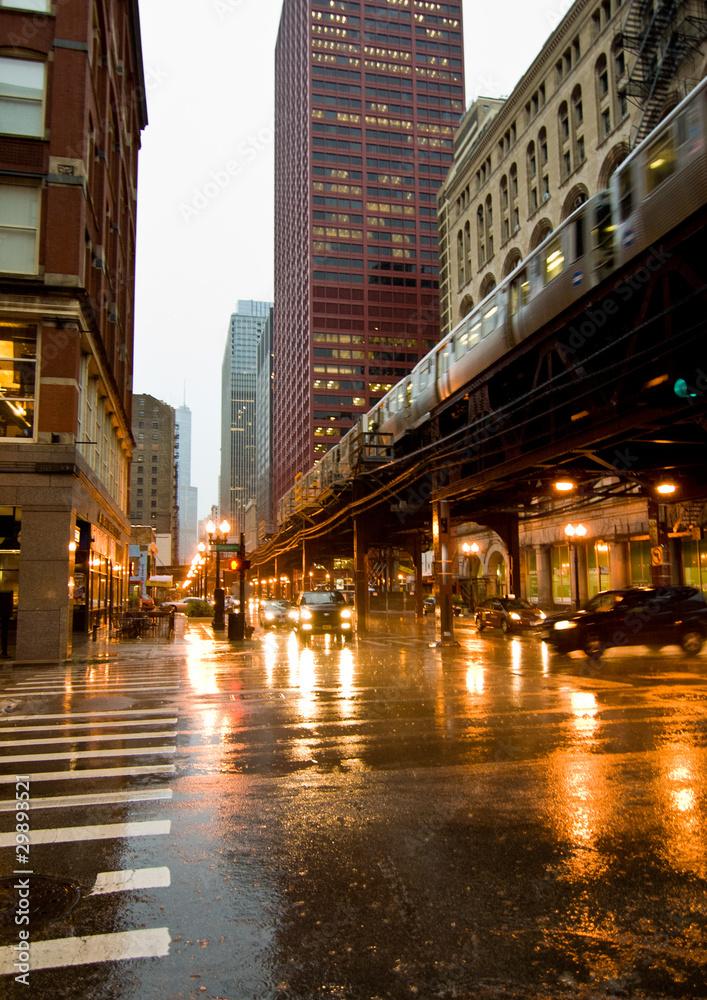Intense Rainfall Sparks Flash Flood Alert Across Chicago
The Chicago metropolitan area is currently facing an escalation in heavy rainfall this Wednesday evening, prompting the issuance of a Flash Flood Warning for several neighborhoods. Torrential rains have transformed streets into fast-moving waterways, causing critically important disruptions to traffic flow and complicating emergency response efforts. Authorities strongly advise residents to steer clear of flood-prone zones and avoid driving through submerged roadways as water levels continue to surge. Flood management teams have been mobilized and are vigilantly tracking critical rivers and drainage systems to mitigate further risks.
The National Weather Service emphasizes essential precautions during this period of severe precipitation:
- Limit travel to only essential trips until conditions stabilize.
- Stay updated via official weather channels and local news outlets.
- Prepare for possible power interruptions caused by storm-related damage.
- Secure outdoor items that could be displaced or damaged by floodwaters.
Emergency personnel are strategically deployed to assist at-risk communities, and designated shelters remain on standby to accommodate displaced individuals if necessary.
| Region | Flood Alert Status | Projected Rainfall (inches) |
|---|---|---|
| Central Chicago | Flash Flood Warning | 2.7 – 3.4 |
| Northwest Suburbs | Flood Watch | 1.6 – 2.2 |
| South Side | Flash Flood Warning | 3.0 – 3.7 |
Effects on Communities and Urban Infrastructure
The ongoing heavy rains have severely impacted neighborhoods throughout Chicago, with numerous reports of flooded basements, clogged storm drains, and inundated streets that have disrupted daily routines. Emergency responders are actively addressing incidents involving stranded motorists and property damage,highlighting the critical need for heightened awareness and caution. Several schools and community facilities in the most affected districts have announced early dismissals to safeguard residents amid deteriorating road conditions and rising floodwaters.
City officials have underscored how this weather event exposes vulnerabilities in the existing infrastructure. Key challenges include:
- Drainage systems overwhelmed, causing water accumulation in both residential and commercial areas.
- Interruptions to public transportation, with bus and train routes experiencing delays and detours.
- Power failures affecting hundreds of households due to submerged electrical installations.
The table below outlines reported infrastructure issues alongside the emergency response teams assigned:
| Issue | Impacted Areas | Response Units |
|---|---|---|
| Flooded Thoroughfares | Downtown, West Side | Traffic Management, Public Works |
| Electrical Outages | South Side, Lakeview | Utility Repair Crews |
| School Closures | Citywide | School District Officials |
Essential Safety Guidelines for Flash Flood Situations
Remain vigilant and minimize exposure to flood hazards. Continuously track weather updates from trusted sources such as the National Weather Service and local news stations. If a flash flood warning is active, follow evacuation instructions without delay and avoid traversing flooded areas on foot or by vehicle. Even shallow moving water-just six inches deep-can knock a person off their feet, while a foot of water can carry away most cars. Secure outdoor possessions that could be swept away and relocate valuables to elevated areas within your home. Ensure mobile devices are fully charged and assemble emergency supplies including flashlights, extra batteries, drinking water, and necessary medications.
Key preparedness actions include:
- Never drive through flooded roadways. Remember the phrase: “Turn around, don’t drown.”
- Stay inside and avoid basements or low-lying rooms prone to flooding.
- Keep family members informed and designate safe meeting points.
- Disconnect electrical appliances to reduce fire and shock risks.
- Use sandbags or waterproof barriers around entry points if available.
| Emergency Supply | Suggested Quantity | Additional Notes |
|---|---|---|
| Flashlights | Two per household member | Include spare batteries |
| Bottled Water | One gallon per person per day | Stockpile for at least three days |
| Non-perishable Food | Three-day supply | Ready-to-eat meals preferred |
| First Aid Kit | One per home | Include essential medications and sanitizers |
Official Guidance on Preparedness and Emergency Actions
Authorities in Chicago are urging residents and commuters to remain alert and prepared as the heavy rainfall persists, creating risky conditions. Emergency management advises keeping emergency kits within easy reach, staying tuned to verified weather updates, and avoiding non-essential travel during the flash flood warning period. Motorists are specifically warned against attempting to cross flooded streets, as water depths can increase suddenly and conceal hazards such as debris or damaged roadways.
- Maintain accessible flashlights, batteries, and critical medications.
- Identify alternative travel routes to circumvent flood-affected zones.
- Keep mobile devices charged to ensure communication.
- Follow directives from local emergency officials without delay.
Emergency responders remain on high alert, coordinating efforts to assist residents in vulnerable neighborhoods. Temporary shelters are being readied to support those displaced by sudden flooding. Citizens are encouraged to promptly report localized flooding and emergencies to expedite response times. The collaboration between municipal agencies, fire departments, and volunteer groups is vital to effectively managing the ongoing weather challenges.
| Contact Resource | Phone Number | Hours of Operation |
|---|---|---|
| City Emergency Hotline | 311 or (312) 744-5000 | 24/7 |
| Chicago Flood Reporting Line | (312) 744-3433 | 7 AM – 10 PM |
| American Red Cross Chicago | (312) 729-6100 | 24/7 |
Looking Ahead: Forecast and Resident Advisories
As the Chicago region continues to grapple with heavy rainfall, residents are strongly encouraged to stay alert and comply with all weather advisories. The National Weather Service’s Flash Flood Warning remains active through Wednesday night, with local officials vigilantly tracking developments. Drivers should exercise extreme caution on waterlogged roads and avoid driving through standing water to prevent accidents. Authorities reiterate the importance of preparedness and community cooperation as the area navigates this challenging weather episode. Updates will be provided continuously by CBS News as the situation evolves.





